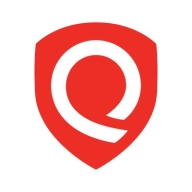


Prisma Cloud by Palo Alto Networks and Qualys TotalCloud are leading solutions in cloud security management. Prisma Cloud is often seen as the superior choice due to its comprehensive multi-cloud security features and dynamic workload identity creation, appealing to complex environments.
Features: Prisma Cloud offers dynamic workload identity creation, compliance tools, and the ability to integrate seamlessly with AWS, ensuring comprehensive security across multi-cloud environments. Users recognize its proficiency in flagging security issues and providing immediate remediation options. Qualys TotalCloud stands out with its powerful vulnerability management capabilities and automation that enhance operational efficiency. Its detailed reporting and real-time protection abilities are among its most valued attributes.
Room for Improvement: Users have noted that Prisma Cloud could benefit from a more simplified user interface, better integration with third-party tools like ServiceNow, and clearer pricing structures. Enhancements in multi-tool integration and advancing API security are also recommended. Qualys TotalCloud is encouraged to improve IP resolution and user interface friendliness to cater to broader user bases. Its focus should also increase on niche device scanning and accelerating vulnerability detection responses.
Ease of Deployment and Customer Service: Prisma Cloud is lauded for its straightforward deployment across hybrid and public cloud setups, supported by Palo Alto’s strong technical support team, despite variable support consistency. Qualys TotalCloud impresses with its flexible deployment pricing and adaptability. However, customization and seamless integration remain challenging, with Prisma Cloud occasionally struggling with automation and TotalCloud's interface complexity from frequent updates.
Pricing and ROI: Prisma Cloud, while perceived as costly, justifies its expense with a comprehensive feature set suitable for large enterprises. Its credit-based licensing offers flexibility, though more transparency in consumption metrics is desired. Qualys TotalCloud is also positioned on the high end of the pricing spectrum but is regarded as cost-efficient due to its versatile capabilities. Users appreciate its competitive pricing, license conversion flexibility, and sustainable ROI potential driven by effective automation and vulnerability management integration.
The detailed information PingSafe gives about how to fix vulnerabilities reduces the time spent on remediation by about 70 to 80 percent.
After implementing SentinelOne, it takes about five to seven minutes.
Our ability to get in and review our vulnerability stance, whether daily, monthly, weekly, or whatever it might be, has drastically improved over our prior provider.
It eliminates the need for additional hardware, making it a financially and technically sound investment.
It helped reduce risks and sped up threat detection.
From a security standpoint, we have significantly enhanced our client's security posture by implementing Prisma Cloud.
It has saved about 90% of our time.
TotalCloud has generated overall savings of 30 to 40 percent across various departments.
CallStream helps us integrate and automate tasks.
When we send an email, they respond quickly and proactively provide solutions.
They took direct responsibility for the system and could solve queries quickly.
Having a reliable team ready and willing to assist with any issues is essential.
Whenever I have issues with the solution, I will get an immediate response from the product team and they will try to close the issue as soon as possible.
When you send them a message, you get a response in a minute or two.
They can respond with technical documentation or pass on the case to the next level because it requires the development of a new feature or changing a feature due to a bug.
They are helpful, respond to my queries, and can answer any question.
Qualys's tech support is highly responsive, providing multiple ways to interact with them.
Qualys' customer service provides quality answers, but the response time is long, even though it is within the SLA.
As soon as we need to add somebody, we just add them to NinjaOne, and then we have a script set up where it automatically deploys and adds them to whichever group we need.
I would rate it a 10 out of 10 for scalability.
Scalability is no longer a concern because Cloud Native Security is a fully cloud-based resource.
It's very scalable and very easy to use.
It's the type of tool that is constantly improving, and its scalability suits our environment well.
If we want to scale, we only need to purchase another license.
We started our organization about nine months back. We started with about 30 users, and we now have more than 100 users.
Our organization currently uses it to manage over 1200 web applications.
It is absolutely scalable, and I would rate its scalability as nine out of ten.
In my experience, there has been 100 percent uptime.
SentinelOne Singularity Cloud is incredibly reliable.
The cloud console is very resilient.
I cannot recall any downtime with the solution.
I would rate it a ten out of ten for stability.
I haven't seen any outages with Prisma Cloud.
Overall, the support provided has been excellent.
It is a stable solution, which is why we chose it.
Continuous monitoring is crucial to ensure system stability and avoid vulnerabilities or threats.
If I had to ask for anything to make it easier, it would be signed images that are GPG signed and a public repository where we can get the bits from.
If they can merge Kubernetes Security with other modules related to Kubernetes, that would help us to get more modules in the current subscription.
As organizations move to the cloud, a cloud posture management tool that offers complete cloud visibility becomes crucial for maintaining compliance.
It is a SaaS solution, but some of my clients have a local regulatory requirement, and they want to install it locally on their premises.
From a developer's perspective, especially for organizations like banks developing their applications, ensuring API security before deploying them to the cloud is crucial.
Prisma Cloud is an excellent tool.
Ideally, the scanner should automatically detect and scan all subdomains, even if not explicitly defined, ensuring comprehensive vulnerability assessment.
Ideally, updates should be more immediate, enabling quicker implementation of solutions.
Our goal is to integrate all these functions into Qualys, creating a single dashboard for comprehensive security monitoring and management.
With very little negotiation involved, we just let them know what we could pay and they were willing to meet us at slightly above what we paid with Sophos, which was still very fair for what we were looking at.
The price was very, very important to us, and it came down to the price when we were doing our evaluations WatchGuard and SentinelOne.
Covering our 50,000 endpoints would have nearly bankrupted most security programs, even well-funded ones like ours.
A strategy to optimize costs will save you money.
The licensing model for data security should be compared to the native security offered by AWS and Azure.
Prisma Cloud is remarkably expensive.
Qualys TotalCloud's pricing is currently acceptable, it is becoming increasingly expensive.
Pricing is managed by our finance team; however, Qualys TotalCloud offers cost-effective licensing flexibility.
Qualys TotalCloud is expensive, but it offers a premier solution with no headaches.
The real-time detection and response capabilities of SentinelOne Singularity Cloud impressive because it is a platform that uses artificial intelligence to determine what is normal and what is abnormal and can lock down any virus it may encounter.
We were shown how ransomware can be immediately stopped in real-time. That was huge.
Our previous product took a lot of man hours to manage. Once we got Singularity Cloud Workload Security, it freed up our time to work on other tasks.
Prisma offers visibility to developers and high-level leadership because the dashboard is excellent and the alerts are comprehensive.
Its ease of integration is valuable because we need to get the solution out of the door quickly, so speed and ease matter.
Security posture management is the most valuable feature.
This view of risk helps reduce the work we would have to do to combine multiple sources to prioritize risk.
It will help cybersecurity professionals monitor the cloud and find vulnerabilities.
We are enjoying the new feature, FlexScan, which is valuable for Internet-facing VMs.



SentinelOne Singularity Cloud Security protects cloud workloads, offering advanced threat detection and automated response. It integrates seamlessly with cloud environments and secures containerized applications and virtual machines against vulnerabilities.
SentinelOne Singularity Cloud Security is renowned for its efficiency in mitigating threats in real-time. The platform integrates effortlessly with existing cloud environments, ensuring robust cloud security management with minimal manual intervention. Securing containerized applications and virtual machines, it excels in threat intelligence and endpoint protection. However, improvements are needed in performance during high workload periods, and more integrations with third-party tools and better documentation would be beneficial. Users often find the installation process complex, support response times slow, and the dashboard's navigation unintuitive.
What are the key features of SentinelOne Singularity Cloud Security?In specific industries, SentinelOne Singularity Cloud Security is implemented to safeguard critical data and infrastructure. Organizations in finance, healthcare, and technology depend on its real-time threat detection and automated response to protect sensitive information. Its ability to secure containerized applications and virtual machines is particularly valuable in dynamic environments where rapid scaling is necessary.
Prisma Cloud by Palo Alto Networks delivers comprehensive security for cloud environments, focusing on workload protection, identity creation, and seamless AWS integration. Its cloud visibility and control, combined with thorough vulnerability scanning, help maintain robust security across multi-cloud platforms.
Prisma Cloud provides essential capabilities for cloud security posture management, container security, and compliance monitoring. Enterprises utilize it to secure cloud configurations, detect vulnerabilities, and ensure regulatory compliance, spanning AWS, Azure, and Google Cloud. Its runtime management, identity-based micro-segmentation, and threat detection enhance cybersecurity. Despite needing improvements in documentation, integration complexities, UI, and the need for role-based access control refinement, it remains pivotal for securing assets across cloud infrastructures, particularly with its capabilities for vulnerability scanning and CI/CD pipeline integration.
What are the key features?
What benefits or ROI should users expect?
In industries like finance, healthcare, and retail, Prisma Cloud is implemented to strengthen cybersecurity measures, facilitate regulatory compliance, and enhance governance. Organizations leverage its features to secure sensitive data, monitor configurations, and integrate security processes within CI/CD workflows, ensuring robust protection across complex cloud infrastructures.
TotalCloud is the Qualys approach to Cloud Native Application Protection Platform (CNAPP) for cloud infrastructure and SaaS environments. With TotalCloud, customers extend TruRisk insights (transparent cyber risk scoring methodology) from the Qualys Enterprise TruRisk Platform to their cloud environments allowing for a seamless unified view of cyber risk across on-prem, hybrid, and multi-cloud environments.
Features and capabilities of Qualys TotalCloud include, but are not limited to:
Discover: Complete visibility and insights into cyber-risk exposure across multi-cloud. Continuously discover and monitor all your workloads across a multi-cloud environment for a 360-degree view of your cloud footprint. Identify known and previously unknown internet-facing assets for 100% visibility and tracking of risks.
Assess: Comprehensive cloud-native assessments with FlexScanTM. Extensive scanning capabilities with Qualys FlexScan, including no-touch, agentless, API- and snapshot-based scanning, along with agent- and network-based scanning for in-depth assessment. Use these multiple scanning methods to scan a workload to get a unified and comprehensive view of vulnerabilities and misconfigurations.
Prioritize: Unified security view to prioritize cloud risk with TruRiskTM. Experience a unified risk-based view of cloud security with insights across workloads, services, and resources. Qualys TruRisk quantifies security risk by workload criticality and vulnerabilities; it correlates with ransomware, malware, and exploitation threat intelligence to prioritize, trace, and reduce risk.
Defend: Real-time protection against evolving and unknown threats with InstaProtectTM. Qualys enables continuous monitoring of all cloud assets to ensure they are protected against threats and attacks at runtime. Qualys keeps your cloud runtime safe by detecting known and unknown threats across the entire kill chain in near real-time across a multi-cloud environment.
Remediate: Fast remediation with QFlow – no code, drag-and-drop workflows. The integration of QFlow technology into Qualys TotalCloud saves security and DevOps teams valuable time and resources. Automation and no-code, drag-and-drop workflows help simplify the time-consuming operational tasks of assessing vulnerabilities on ephemeral cloud assets, alerting on high-priority threats, remediating misconfigurations, and quarantining high-risk assets.
We monitor all Cloud-Native Application Protection Platforms (CNAPP) reviews to prevent fraudulent reviews and keep review quality high. We do not post reviews by company employees or direct competitors. We validate each review for authenticity via cross-reference with LinkedIn, and personal follow-up with the reviewer when necessary.